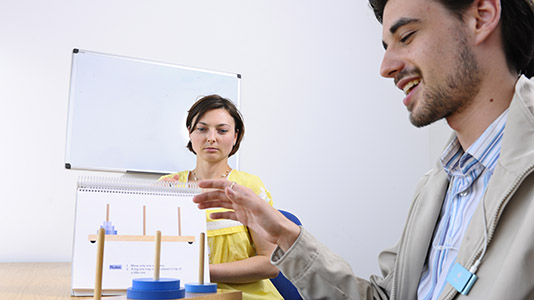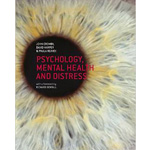Overview
Our MSc and PgCert courses have a distinctive emphasis on the experiences of people who live with distress. You'll focus on the treatment of mental distress in both clinical and community settings, as well as developing an understanding of prevention and community means of social support and guidance.

Why Psychology at LSBU?
- check-circle
- All students on the MSc programme can undertake a clinically relevant placement in the community or within the NHS.
- building
- Dedicated facilities – our lab complex includes an eye-tracking facility and observation room.
- user
- Experts by experience (sometimes referred to as service users) are heavily involved in the delivery and design of the course.
- eye
- Jacqui Dillon (chair of the Hearing Voices Network) is a consultant on the implementation of this unique programme.
| ModeFull-time | Duration12 months | Start dateSeptember | Application code4431 | Application method Direct to LSBU |
| ModePart-time | Duration24 months | Start dateSeptember | Application code4432 | Application method Direct to LSBU |
| ModePGC | Duration12 months | Start dateSeptember | Application code5427 | Application method Direct to LSBU |
Location
London South Bank University student union is located at 103 Borough Rd, London SE1 0AA.
If you are visiting our Southwark Campus, you may wish to use our downloadable campus map (PNG File 466 KB). For information on accessibility, see our DisabledGo access guides. See our location page for more details.
Entry Level Requirements
Want to start your course this September? call 0800 923 8888 for entry requirements.
MSc
2:1 undergraduate degree in Psychology or an allied field such as neuroscience, social work, nursing, medicine or psycho-social studies.
PgCert
2:2 undergraduate degree in Psychology or an allied field such as neuroscience, social work, nursing, medicine or psycho-social studies.
Please note that anyone wishing to go on to Doctoral training in Clinical Psychology in the UK must have a British Psychological Society accredited BSc in (hons) Psychology, often with least a 2:1 classification. Please check all courses you intend apply to for further information on this and other entry requirements for progression to Doctoral training in Clinical Psychology in the UK.
Choose your country
Select country here:
Missing English and Maths qualifications?
If you do not have the required English and Maths qualifications needed to satisfy the entry requirements for this programme, we have courses available at our partner College that you can take to upskill in these areas. Find out more at South Bank College.
United Kingdom
£11500
Tuition fees for home students
International
£17600
Tuition fees for international students
Tuition fees are subject to annual inflationary increases. Find out more about tuition fees for Undergraduate or Postgraduate courses.
-
Part-time
part-time
MSc Mental Health and Clinical Psychology (PT) - Year 1
UK fee: £2555.56 International fee: £3911.11 AOS/LSBU code: 4432 Session code: 1PS00 Total course fee: * The full amount is subject to fee increases, the total shown below is based on current fees.
UK: £11500 International: £17600 MSc Mental Health and Clinical Psychology (PT) - Year 2
UK fee: £8944.44 International fee: £13688.89 AOS/LSBU code: 4432 Session code: 2PS00 Total course fee: * The full amount is subject to fee increases, the total shown below is based on current fees.
UK: £11500 International: £17600 -
Full-time
full-time
MSc Mental Health and Clinical Psychology (FT) - Year 1
UK fee: £11500 International fee: £17600 AOS/LSBU code: 4431 Session code: 1FS00
For more information, including how and when to pay, see our fees and funding section for postgraduate students.
See our Tuition Fees Regulations (PDF File 391 KB) and Refund Policy (PDF File 775 KB).
Possible fee changes
The University reserves the right to increase its fees in line with changes to legislation, regulation and any government guidance or decisions.
The fees for international students are reviewed annually and the University reserves the right to increase the tuition fees in line with the RPIX measure of inflation up to 4 per cent.
Postgraduate loan (PGL) for Masters study
If you are starting a Masters course, studying either full- or part-time, you may be entitled to apply for a postgraduate study loan. Find out more at our postgraduate fees and funding section.
Scholarships
We offer several types of fee reduction through our scholarships and bursaries. Find the full list and other useful information on funding your studies on the scholarships and fee discounts page.
Fee status
Please check your fee status and whether you are considered a Home, EU or International student for fee-paying purposes and for our regulatory returns, by reading the UKCISA regulations.
Home
| Mode Full-time | Duration 12 months | Start date September | Application code 4431 | Application method Direct to LSBU |
| Mode Part-time | Duration 24 months | Start date September | Application code 4432 | Application method Direct to LSBU |
| Mode PGC | Duration 12 months | Start date September | Application code 5427 | Application method Direct to LSBU |
Applicants whos BSc (Hons) Psychology is not BPS accredited may consider LSBU's MSc Psychology (Conversion).
For more information or an informal discussion with the Course Director, please contact Dr Allan Tyler on tylera4@lsbu.ac.ukA
Postgraduate students and research students should apply through our dedicated application system. Full details of how to do this are supplied on our How to apply section for postgraduate students and our How to apply section for research students.
See our admissions policy (PDF File 1,043 KB) and complaints policy (PDF File 516 KB).
Accommodation
Students should apply for accommodation at London South Bank University (LSBU) as soon as possible, once we have made an offer of a place on one of our academic courses. Read more about applying for accommodation at LSBU.
Finance
It's a good idea to think about how you'll pay university tuition and maintenance costs while you're still applying for a place to study. Remember – you don't need to wait for a confirmed place on a course to start applying for student finance. Read how to pay your fees as a postgraduate student.
Prepare to start
We help our students prepare for university even before the semester starts. To find out when you should apply for your LSBU accommodation or student finance read the How to apply tab for this course.
Enrolment
Before you start your course we’ll send you information on what you’ll need to do before you arrive and during your first few days on campus. You can read about the process on our Enrolment pages.
All modules are assessed by a mix of coursework, examinations, presentations and a placement log.
MSc students complete all modules. PgCert students complete Exploring Mental Health and Distress; Introduction to Clinical Skills; and Psychosocial Interventions.
- Exploring mental health and distress in the clinic and community
This course will cover a range of distressing experiences commonly encountered in mental health services, explored from a community and clinical psychology perspective. - Research methods for mental health
You'll cover the necessary quantitative and qualitative methods required to complete a Masters dissertation. - Psychosocial interventions and treatments
You'll be introduced to a number of interventions commonly adopted by mental health professionals, including cognitive behavioural, systemic, and counselling perspectives, in both clinical and community settings. Theoretical perspectives underpinning these approaches will be fully explored. - Experts by experience
Taught by individuals who have experienced mental distress, this module will cover experiential perspectives on mental distress, exploring what it's like to live with distress, and how individuals have understood, managed and recovered from their experiences. - Introduction to clinical skills
You'll gain practical experiences of a range of counselling and psychotherapy techniques to enrich your practical knowledge. - Placement module
You'll have the opportunity to work directly with individuals and groups with mental health difficulties. - Dissertation
You'll carry out an independent project, supervised by an experienced member of staff.
Careers
Employability Service
At LSBU, we want to set you up for a successful career. During your studies – and for two years after you graduate – you’ll have access to our Employability Service, which includes:
- An online board where you can see a wide range of placements: part-time, full-time or voluntary. You can also drop in to see our Job Shop advisers, who are always available to help you take the next step in your search.
- Our Careers Gym offering group workshops on CVs, interview techniques and finding work experience, as well as regular presentations from employers across a range of sectors.
Our Student Enterprise team can also help you start your own business and develop valuable entrepreneurial skills.
We have placed employability at the heart of the psychology courses. You'll benefit from an annual psychology specific careers day, clear signposting of skills development within modules and career opportunities from the School and across the University.
You could go on to further training in a number of areas including clinical psychology, psychotherapy, care coordination, social work, mental health nursing and occupational therapy, though please be aware that many of these training programmes require previous and substantial work experience. The course could also help you gain roles and responsibilities within charities and NGOs.
Please note that successful completion of the programme does not qualify you to practice as a clinical psychologist in the UK and will not allow you to register with the Health Professions Council as a 'practitioner psychologist', nor to use the protected title 'clinical psychologist'. If you wish to apply for UK Doctoral training you must still have a BPS accredited undergraduate degree in Psychology (a good upper second is often a minimum requirement). This Masters course does not substitute the BPS accreditation requirement.
LSBU has strong links with a number of NHS trusts, as well as voluntary mental health organisations, including Changing Lives and the UK Hearing Voices Network.
Clinical placements
We have a placement lead on staff who will do their utmost to assist students in finding a suitable placement in a mental health setting, but it is the responsibility of the student to find a placement in the community or within the NHS. LSBU has excellent links with various mental health organisations.
Previous students have had placements as support workers, recovery workers, and honorary assistant psychologists at organisations including South London and Maudsley NHS Foundation Trust, Oxleas NHS Foundation Trust, Cyrenians (supported housing), Camden MIND (recovery and support) and Phoenix Futures (recovery from substance use).
Students also have the option of completing a professional placement skills class, to enhance their skills ready for clinical work.
Teaching and Assessment
You'll benefit from small group teaching, as well as receive tutoring sessions to provide further advice and support for future employment. Learning will also be supported via e-learning sites.

- Course founder Paula Reavey received the British Psychological Society 'Book of the Year 2014' award for 'Psychology, Mental Health and Distress', which she co-authored.
Academic tutoring
As an Applied Sciences student, you will be allocated a named academic tutor during your first three weeks at LSBU. The role of your academic tutor is to be your primary contact for academic and professional development support.
Your academic tutor will support you to get the most of your time at LSBU, providing advice and signposting to other sources of support in the University.
Your academic tutor should be the first person at the university that you speak to if you are having any difficulties that are affecting your work. These could be academic, financial, health-related or another type of problem.
You will have appointments with your academic tutor a minimum of once per semester for 30 minutes throughout your course. This is often supplemented with additional meetings arranged via email as and when students need support. In addition to this Learning Support hours for all teaching staff will be advertised and available for you to book additional time for support related to a specific teaching session.



